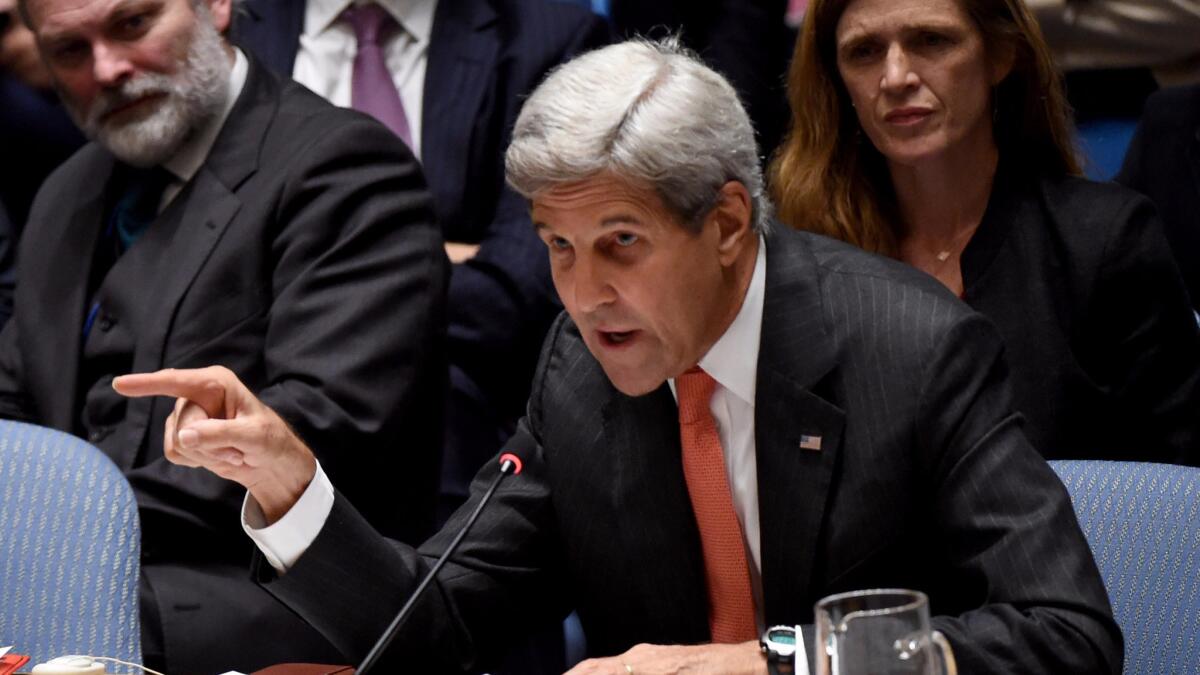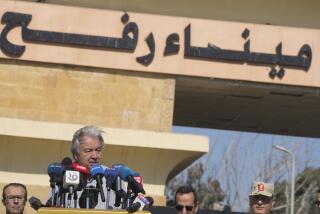Kerry lashes out at Russia, calls for grounding of all aircraft over humanitarian routes in Syria

Reporting from WASHINGTON — Amid a fresh round of bloodletting in Syria, Secretary of State John F. Kerry called Wednesday for the grounding of all aircraft in key opposition-held areas of the country in an attempt to shore up a shattered cease-fire and rush humanitarian aid to those in the direst need.
Speaking at a public session of the United Nations Security Council, Kerry unleashed some of his harshest rhetoric yet at Russia over its actions in Syria. His words underscored the fragility of efforts to not only revive the faltering cease-fire that went into effect nine days ago, but also forge an alliance between Washington and Moscow to confront the militants of Islamic State and Al Qaeda on the battleground.
Kerry said the conflict was at a crossroads. “If we decide not to do what it takes to make this work — this cessation of hostilities — then make no mistake, my friends, the next time we convene here, we are going to be facing a Middle East with even more refugees, with more dead, with more displaced, with more extremists, with more suffering on a greater scale. That is a certainty.”
The diplomatic parley came hours after a Paris-based medical relief organization said a mobile emergency unit outside Aleppo was hit by an airstrike, killing five of its staff members.
That strike came on the heels of an attack about 24 hours earlier on a Syrian Red Crescent aid convoy, which left 21 civilians dead and drew blistering condemnation at this week’s convening of the U.N. General Assembly.
U.S. officials believe Russia was responsible, but Russia sought again Wednesday to deflect the blame, asserting that an American drone was in the area at the time.
“We can confirm that none of our aircraft — manned or unmanned, U.S. or coalition — were anywhere in the vicinity of Aleppo when the strike against the humanitarian convoy occurred,” said Capt. Jeff Davis, a Pentagon spokesman.
The convoy attack prompted the U.N. to temporarily halt aid deliveries in Syria, but the world body said Wednesday that they would resume.
Truckloads of aid at the Turkish border “have been ready to roll, but we have not received the clearances we needed,” said Farhan Haq, deputy spokesman for the U.N. secretary-general. “We still need to hear from the Syrian government that those trucks can come through. They control the borders.”
Kerry’s appeal came as the Obama administration was debating whether to arm Syrian Kurds in their fight against Islamic State, according to U.S. officials who were not authorized to speak publicly about the program. The plan, devised by the Pentagon’s Central Command, which oversees U.S. military operations in the Middle East, could boost the fighting capability of Kurdish militias as they push south into the heart of Islamic State territory.
Administration officials acknowledged it is certain to create tensions with Turkey. “At this point, it’s just a plan,” one official said. “Any decision will be made by the White House.”
At the same time, the number of U.S.-backed armed rebels in Syria has grown as the multisided war continues to expand. There are about 30,000 such rebels in Syria today, compared with a few hundred last year, Gen. Joseph F. Dunford Jr., chairman of the Joint Chiefs of Staff, said in a speech Wednesday to the Air Force Assn. conference in National Harbor, Md.
The force partly comprises Syrian Kurdish militias that Turkey’s government considers terrorist groups. Ankara fears Kurdish ambitions to form a contiguous independent region along Turkey’s southern border. To allay Turkish concerns, Dunford said that the Pentagon has helped recruit about 14,000 Arabs into the Kurdish-dominated Syrian Democratic Forces.Until now, the U.S. has provided military assistance, including weapons, to Syrian Arab rebels but has refrained from supplying arms to the Syrian Kurds.
The original cease-fire deal, which took effect Sept. 12, did not apply to Islamic State or to Al Qaeda-linked groups, and Syria said it would continue operations against those fighters.
The accord led to an initial drop-off in violence, but then began to unravel at an accelerating pace. It marked the latest in a series of fitful international efforts to stem the fighting in Syria, which has killed more than 400,000 people, sparked what is widely described as the worst refugee crisis to strike Europe since World War II and provided a vital incubator for Islamic State, which has staged terrorist strikes spanning the globe.
Adding to tensions, Russian military officials announced Wednesday that the nation’s only aircraft carrier, the Admiral Kuznetsov, would be deployed to the eastern Mediterranean, joining other Russian vessels in the area.
Just before Kerry spoke, Russian Foreign Minister Sergei Lavrov again declined to accept responsibility for the attack on the convoy.
Kerry responded with anger and incredulity to Russia’s positing of various alternative scenarios having caused the carnage, saying he felt as if “we’re sort of in a parallel universe here.”
Citing theorizing by Russia’s Defense Ministry that “the trucks and the food and the medicine just spontaneously combusted,” he demanded: “Anyone here believe that?”
U.S. intelligence analysts believe two Russian Su-24 attack jets carried out the deadly attack on the United Nations’ humanitarian aid convoy near Aleppo, according to U.S. officials not authorized to speak publicly on intelligence matters. Analysts have examined the radar signatures and electronic emissions of the aircraft in the skies near where the truck convoy was hit Monday night.
“We’re still analyzing information, but all signs point to the Russians,” one official said.
As for the reports of the latest fatal strike on the medical unit, Kerry again attributed responsibility to Russia and its ally, the government of President Bashar Assad.
“There are only two countries that have airplanes that are flying during the night or flying at all in that particular area — Russia and Syria,” he said.
It was not immediately clear whether other key players would heed the call for a no-fly zone over the opposition-held areas of northern Syria, a step Kerry said was essential for restoring credibility to efforts to salvage the cease-fire and seek a negotiated end to the brutal five-year conflict.
“We must immediately ground all aircraft flying in those key areas in order to deescalate the situation and give a chance for humanitarian assistance to flow unimpeded,” he said.
Kerry also expressed remorse over an accidental strike by the U.S.-led coalition over the weekend that killed more than 60 Syrian soldiers — but contrasted the American response to that of Russia in the aftermath of the convoy strike.
“Within moments of it happening, we acknowledged it,” he said. “We didn’t put out a bunch of obfuscating facts — we said, ‘Yeah, it’s a terrible thing, it happened.’”
More discussions on Syria are set later this week in New York, after meetings Tuesday of envoys from across Europe and the Arab world.
Times staff writer Molly Hennessy-Fiske in Cairo contributed to this report.
MORE WORLD NEWS
Vladimir Putin is the man to watch at the UN as he deepens Russia’s role in the Middle East
Iraqi forces being trained to recapture Mosul will be ready next month, Joint Chiefs chairman says
This senator is the last major obstacle to the Philippines’ war on drugs. She may end up behind bars
UPDATES:
1:14 p.m.: This article was updated with a comment from the Pentagon.
12:46 p.m.: This article was updated with more details about U.N. aid deliveries to Syria.
This article was originally published at 12:05 p.m.
More to Read
Sign up for Essential California
The most important California stories and recommendations in your inbox every morning.
You may occasionally receive promotional content from the Los Angeles Times.











